- Home
- L. Ron Hubbard
Mission Earth Volume 2: Black Genesis Page 25
Mission Earth Volume 2: Black Genesis Read online
Page 25
It catapulted into space!
PART SIXTEEN
Chapter 5
Even before it hit the street below, Heller shouted to Mortie, “Take over!”
There was a crash below!
Heller was out. The rail was torn into jagged pickets where the cab had disappeared.
He peered down. There were girders and supports.
He went through the hole in the rail. He swarmed down a girder. He slid down a pillar and hit the lower street.
The other cab had landed on its wheels, shot ahead and struck a stanchion.
Gas was flooding the street!
A traffic light was nearby. Heller looked at the control box.
He raced over to the cab.
The doors were buckled.
He yanked a small jimmy out of his pocket and went to work on the rear door. The metal bent around the jammed lock. He inserted the jimmy higher and pried. He got his fingers in and, with a heave, got the door open.
He glanced at the spreading gasoline and then at the traffic light. Suddenly I knew why. Fumes, rising, would explode when they hit those control box switches! Like a bomb! I know bombs!
Heller had the driver out. Then he reached in and grabbed the man in the back.
Lugging two bodies, he sped over to the curb.
He looked back. He evidently decided he was not far enough. He went another fifty feet.
On the pavement, in the protection of a big concrete abutment, he laid the bodies out.
With a shattering blue crash, the wreck exploded!
The “cabby” was dead. But even though the top of his head was half off, he was obviously a Sicilian.
Heller turned to the other one.
The weird hue of the street light shone down upon the face of Torpedo Fiaccola!
The hit man’s eyelids fluttered. He was still alive!
A squad car chortled in the distance. Nobody could have missed that blast for a mile!
Torpedo opened his eyes. He saw Heller. He recognized him.
Torpedo said, “You ain’t going to kill my mother?”
Heller looked down at him. “I’ll think about it.”
“No!”
Heller reached into Torpedo’s coat and took his wallet. The money was only the five thousand that Heller had given him back. But there was a slip of paper. It said:
Valid with the evidence. Hand package to bearer.
Heller shook the paper at Torpedo. “Hand to who?”
Torpedo said, “You going to kill my mother?”
“I was thinking about it. Give me the name and address for this slip and I might reconsider.”
The hood was blinking hard. Then he said, “Mamie. Apartment 18F, 231 Binetta Lane. Downtown.”
“And the evidence?” said Heller.
“Look,” moaned Torpedo, “Bury is going to kill me!”
Heller said, “Mothers should be cherished.”
Torpedo shuddered. “Your baseball cap with blood on it and a lock of your hair.”
Heller took off his cap, turned it wrong side out and swabbed it through the mess that had been the driver’s head.
He said, “I hear an ambulance coming. Get yourself patched up in the hospital and then I’d advise you to take up residence at the North Pole.” He bent over him and put the wallet and five thousand back in his pocket. “I keep trying to give you this. Now take it and learn to speak polar bear. I’m not a mother killer but I sure enjoy exploding torpedoes!”
The squad car had been drifting slowly closer, cautiously. The flames flickering from the wreck made a shifting patchwork on it. The cops got out.
“How come you drug the bodies from the wreck, kid?” said the first cop, threateningly.
“He just missed me,” said Heller. “I wanted to give him some advice.”
“Oh,” said the cop in sudden comprehension. “But I’ll have to give the driver a ticket all the same.” He got out his book and called to his partner. “What would you say the charge was, Pete?”
“Littering,” said the other cop.
“It’s that one that was driving,” said Heller. “He’s dead.”
“Gets the ticket all the same,” said the cop, writing.
The ambulance was whining up, probably called by the cops earlier.
Mortie Massacurovitch had brought the old cab down to the lower level. Heller got in. “Take me to 231 Binetta Lane.”
“That’s Little Italy,” said Mortie. “Wrong time of night. You got a gun?”
“I got another hundred,” said Heller.
They zipped downtown. They went from Eleventh Avenue to Tenth, shifted over on l4th Street, went down Greenwich Avenue, worked their way around Washington Square and were soon in Little Italy. They stopped across the street from the address. It was awfully dark.
Heller took out a knife, cut off a small lock of his own hair and pasted it into the baseball cap with the blood. Then he put the note in it.
He turned to Mortie. “Go to Apartment 18F and ask for Mamie. Give her this and she’ll give you a package.”
“In there?” said Mortie, looking at the ominously dark building. “And when you return,” said Heller, “I’ll give you another hundred.”
Mortie grabbed the cap and contents, leaped out, raced up the steps.
Three minutes later, he raced down the steps carrying a package. He threw it at Heller, started the car up and got out of there.
“Mamie was a man with a gun,” said Mortie. “But he took it with no questions.”
Heller told him to take him to the corner of First Avenue and 42nd Street. He shook the pack, listened to it and then sniffed it. Well, at last he was getting cautious for it well could have been a bomb. He pried up a corner and pulled something out.
“What’s a first-class ticket to . . . Buenos Aires , Argentina, worth?” he asked Mortie.
“I dunno,” said Mortie. “Maybe three grand.”
“Can you cash one in?”
“Oh, sure,” said Mortie. “Just take it to the air terminal. What’s the matter, ain’t you going?”
Oh, if Heller only were!
Mortie let him out at First and 42nd. Heller said, “Now, do you think I really passed, or do I need more lessons?”
Mortie appeared to be thinking it over carefully. Then he said, “Well, kid, with experience you could become a top New York cabby. There’s more I could teach you about shortchanging customers and running up extra meterage but, otherwise, that’s about it. You pass. Yes, I’d say you pass.”
Heller counted him out six one-hundred-dollar bills. He instantly stuffed the money in his shirt and drove away at high speed.
Heller trotted along, clickety-clack, and soon arrived at the Gracious Palms.
In his room he opened the pack. Money in small old bills!
He counted it. ONE HUNDRED THOUSAND DOLLARS!
I shuddered. My Gods, Bury must be angry to offer such a price!
Heller put it in the paper sack his breakfast had come in. He went down to the personal safes and put it in.
Vantagio was in his office and saw Heller through the open door. He called to him, “Getting out some money, kid? You’ll need dough for school! Don’t blow all you got on night life. This is an expensive town!”
“It sure is,” said Heller, adding the hundred grand to his fifty thousand already in the safe. “Prices just keep going up!”
He went to bed and was shortly peacefully asleep.
I wasn’t! Bury had unlimited funds and I didn’t even have a clue on how to get that platen!
Some hours later, the next report of Raht and Terb didn’t help. It said:
He went to a place called the Tall Man’s Shop and they must have given him a job and a place to sleep. He’s still there! But we have our eyes on him.
The Hells they did! They were still spotting in on the bug we had sewn in his coat!
I was getting frightened that I might have to go to America myself to handle this. And I didn’t h
ave the least idea what I could do even if I did.
PART SIXTEEN
Chapter 6
Heller was up bright and early the following day, the viewer alarm blasting me out of a sodden sleep.
He was being very industrious and purposeful. He brushed his new suit where it had been messed up on the girders, put on a clean white shirt with an Eton collar, put a new baseball cap on the back of his head and then packed a shoulder-strap satchel which looked, for all the world, like one of these kiddy schoolbook bags.
In the bag he put a spool of fishline, a multihooked bass plug, a tool kit, a dozen baseballs, a roll of tape and the New Jersey license plates. Was he going fishing?
Down to the lobby he went. It was early for a whorehouse: the desk clerk was asleep, a guard in a tuxedo was reading the Daily Racing Form, ballpoint in hand, and an Arab sheik was wandering drunkenly around, apparently trying to choose amongst several throw rugs as to which would be best to use for morning prayer.
Heller counted ten thousand out of his personal safe and put it in his pockets. The Arab gave him a deep obeisance, Heller repeated the bow and hand motion exactly and presently was trotting down the street, clickety-clack.
He stopped at a deli and got breakfast in a sack, went out and found a cab.
“Weehawken, New Jersey,” said Heller. “One way.” And he gave the address of the garage where the Cadillac was!
“Double fare as you won’ be comin’ back,” said the cabby.
I suddenly chilled. Up to then I had not grasped what Heller was going to do! He was on his way to get his car! Bury knew where that car was. It would be rigged! That “won’t be coming back” was all too prophetic!
“Double fare,” agreed Heller.
He had his sweet rolls and coffee as he rode along. They were soon across town. They dove into the Lincoln Tunnel and roared along under the Hudson River. They soon were in New Jersey and turned north on the J F Kennedy Boulevard.
They turned out of the roaring traffic to approach the garage. But one block away from it, Heller told the cab to stop and wait. The cabby looked at the decayed, semi-industrial neighborhood. “You mean wait here?” he asked.
Heller took a fifty-dollar bill, tore it in half and gave the driver half.
“I’ll wait,” said the cabby.
Heller got out and trotted around a corner en route to the garage. He stopped.
Trucks! Trucks! Trucks! The whole area in front of the huge, low building was jammed with trucks! Crews of men were unloading stacks of cartons onto handcarts and taking them into the building.
Heller went closer. He stood at the garage door and looked in. The place was being filled up with stacks of cartons higher than a man’s head and in separate islands.
He moved a bit to see deeper in. The Cadillac was there. The license plates were missing.
There was something else going on. Voices. Heller shifted. He saw the plump young man and a burly monster dressed like a trucker. They were having a flaming argument.
“I don’t care! I don’t care!” the plump young man was shouting. “You can’t store that stuff in here. I don’t care whose orders it is! You don’t understand!” He half gestured toward the Cadillac and then didn’t.
Abruptly I knew his dilemma. The crews were putting valuable stuff in a garage/warehouse with a car which was rigged! And the young man couldn’t say why.
“We ain’t clearing nothing back out!” said the burly man. “If you’d been here on time, we mighta listened. But it’s too late now! This stuff stays! Besides, we get our orders just like you. I am not going to let some punk like you work my men’s (bleeps) off just . . .”
The plump young man had seen Heller at the door. He stiffened. He turned and raced off to an exit in the back wall like the Devils were after him. He vanished.
Heller quietly withdrew. He walked through the boil of men and handtrucks, turned the corner and got back in the cab.
“You got further to go,” said Heller. “Take me to 136 Crystal Parkway, Bayonne.”
The New York cabby had to look at a map. “This is foreign country,” he explained. “It ain’t as if you were still in civilization. This is New Jersey. And you can’t ask directions. The natives lie!”
But soon they were headed south on J F Kennedy Boulevard, got through Union City, went under the Pulaski Skyway, passed St. Peter’s College and roared along through the increased traffic of Jersey City. Docks and glimpses of the New York skyline could be seen.
“Is that a statue way over there in the water?” asked Heller, pointing east.
“Jesus,” said the cabby, “don’t you recognize the Statue of Liberty? You should know your country, kid.”
They went past the Jersey City State College and were soon in Bayonne. The New York cabby was shortly all tangled up. They got turned back from the Military Ocean Terminal, got trapped into going to Staten Island, came back over the Bayonne Bridge—paying a toll both ways—and finally asked a native.
Ten minutes later they were in an isolated area of new high-rises and on a quiet street. Here was 136 Crystal Parkway, a very splendid building. A new condo.
Heller repaired the torn fifty and paid the driver off. “I don’t know if I will ever find my way home,” mourned the cabby.
Heller added a twenty. “Hire a native guide,” he said.
The driver drove off.
All this time, I had been cudgeling my brains to remember where I had heard that address.
Heller walked in through a plush entrance. There were several elevators. One of them said:
Penthouse
He pushed the call button.
Expecting an automatic elevator, I was a bit surprised to see the door opened by a man. He was not an elevator operator. He wore a double-breasted coat and a hat pulled down. I could see the bulge of a shoulder-holstered gun. He was very dark, very Sicilian.
“Yeah?” he said noncommittally.
“I would like to see Mrs. Corleone,” said Heller.
I freaked! He was calling on the head of the New Jersey Mafia!
“Yeah?”
“I saw Jimmy ‘The Gutter’ Tavilnasty recently,” said Heller.
Then it all came to me with a flash. That meeting in Afyon when Jimmy, in the dark, had mistaken him for a DEA man! Well, they’d soon see through that! And I didn’t have the platen!
“ID,” demanded the gangster and Heller showed it to him.
The hood was on the elevator telephone. It was in a felt-lined box. You couldn’t hear what was being said.
With a slit-eyed look at Heller, the hood frisked him lightly, inspected his bag and then gestured for him to get in.
They rode up to the top. It was a one-stop elevator, penthouse only. The hood opened the door and pushed Heller out ahead of him. With little punches from behind he directed him down a beautifully decorated hallway. He opened a door at the end and shoved Heller in.
It was a gorgeous room, all done in modern gold and beige. A vast picture window looked out over a vast park and a bay.
A woman was seated comfortably on a couch. She was wearing beige lounging pajamas of silk. She was blond with blue eyes. Her corn silk hair was in coiled braids that wound around the top of her head to make a sort of crown. She was about forty.
She laid down a glossy style magazine she had been reading and stood up.
My Gods, she was tall!
She looked at Heller and then walked across the room to him. She was at least four inches taller than Heller! An Amazon!
She was smiling. “And so you are a friend of dear Jimmy’s,” she said. “Don’t be shy. He has often spoken of his friends in the younger street gangs. But you don’t look like one of those.” She had a sort of cooing, affected voice and a fake Park Avenue accent.
“I’m going to college,” said Heller.
“Oh,” she said in sudden understanding. “That is the smart thing to do these days. Do sit down. Jimmy’s friends are always welcome here. Would you like
something to drink?”
“It’s a hot day,” said Heller. “How about some beer?”
She wagged a finger at him, kittenishly. “Naughty. Really naughty. You realize that would be against the law.” Then she raised her head and bellowed, “Gregorio!”
Almost instantly, a white-coated, very dark Italian popped in.
“Get the young gentleman some milk and bring me some seltzer water.”
Gregorio was taken aback. “Milk? We ain’t got any milk, Babe.”
“Well, get out and get some god (bleeped) milk!” roared Babe Corleone. Then she ensconced herself again on the couch. In her sweet, cooing, affected Park Avenue voice she said, “And how is dear Jimmy?”
Heller only sat down when she did. He now had his cap on his knee. The courteous Fleet officer!
“He was just fine a few days ago,” said Heller. “Seemed to be right on the job.”
“Oh, that is so nice to hear,” cooed Babe. “And nice of him to send word.”
“And how is the family?” said Heller.
Ouch, I thought. The (bleeped) fool thought a “family” was a real family. In that country, on this planet, it means a Mafia mob!
She looked sad. “Not too well, I’m afraid. You see, dear ‘Holy Joe’—how I miss him—was a man of tradition. He used to say, ‘What was good enough for my father is good enough for me.’ And he stuck with good, honest bootlegging and smuggling and such. And, of course, we have to respect that. And drugs are no good anyway.”
“They sure aren’t!” said Heller with conviction.
She looked at him with approval. Then she continued. “Since Faustino ‘The Noose’ Narcotici has gotten so much backing from upstairs, there’s no holding him. He has been muscling in on our New York interests and is even trying to push his way into New Jersey. When they wasted dear ‘Holy Joe,’ that was just the beginning of it. But,” she looked up with sad bravery, “we are trying to carry on.”
“Oh, I’m sure you’ll succeed,” said Heller politely.
“That’s very nice of you to say so, Jerome. I can call you Jerome, can’t I? Everyone calls me Babe.”
“Certainly, Mrs. Corleone,” said Heller. Fleet manners. And then, for a moment, I thought he’d blown it. “Mrs. Corleone, do you mind if I ask you a personal question?”

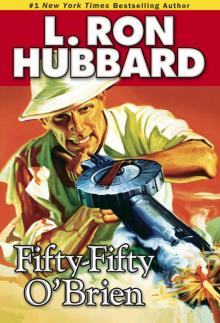 Fifty-Fifty O'Brien
Fifty-Fifty O'Brien Villainy Victorious
Villainy Victorious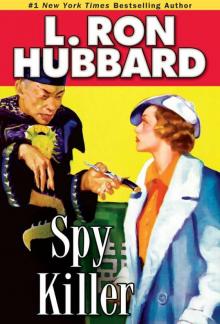 Spy Killer
Spy Killer Ai! Pedrito!: When Intelligence Goes Wrong
Ai! Pedrito!: When Intelligence Goes Wrong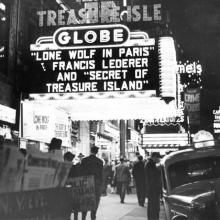 The Dangerous Dimension
The Dangerous Dimension Mission Earth Volume 1: The Invaders Plan
Mission Earth Volume 1: The Invaders Plan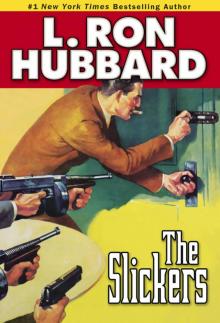 The Slickers
The Slickers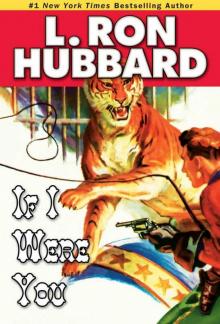 If I Were You
If I Were You The Doomed Planet
The Doomed Planet Writers of the Future Volume 31
Writers of the Future Volume 31 Mission Earth Volume 2: Black Genesis
Mission Earth Volume 2: Black Genesis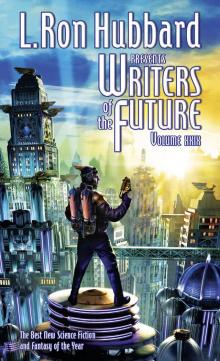 Writers of the Future: 29
Writers of the Future: 29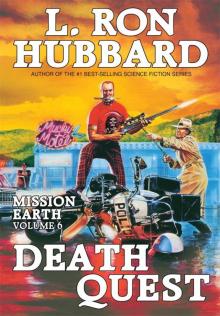 Death Quest
Death Quest The Enemy Within
The Enemy Within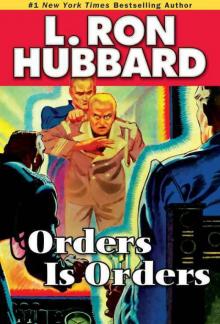 Orders Is Orders
Orders Is Orders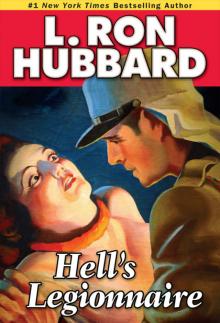 Hell's Legionnaire
Hell's Legionnaire L. Ron Hubbard Presents Writers of the Future 34
L. Ron Hubbard Presents Writers of the Future 34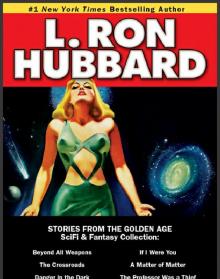 The Scifi & Fantasy Collection
The Scifi & Fantasy Collection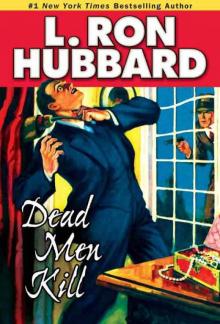 Dead Men Kill
Dead Men Kill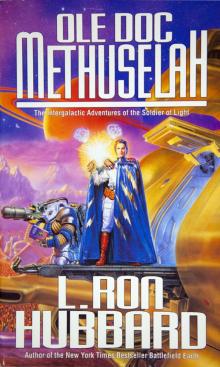 Ole Doc Methuselah: The Intergalactic Adventures of the Soldier of Light
Ole Doc Methuselah: The Intergalactic Adventures of the Soldier of Light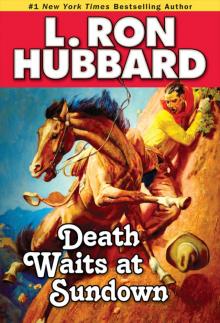 Shadows From Boot Hill
Shadows From Boot Hill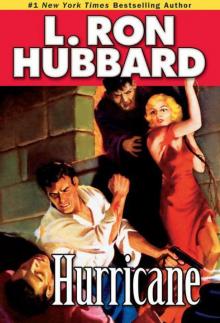 Hurricane
Hurricane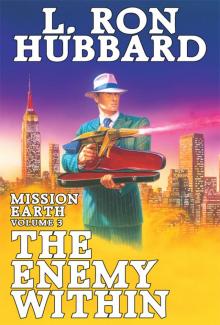 Mission Earth Volume 3: The Enemy Within
Mission Earth Volume 3: The Enemy Within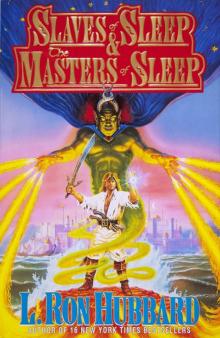 Slaves of Sleep & the Masters of Sleep
Slaves of Sleep & the Masters of Sleep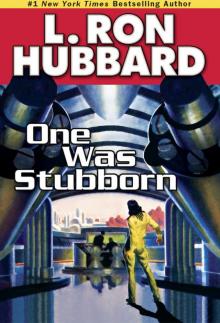 One Was Stubborn
One Was Stubborn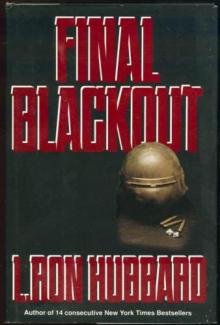 Final Blackout: A Futuristic War Novel
Final Blackout: A Futuristic War Novel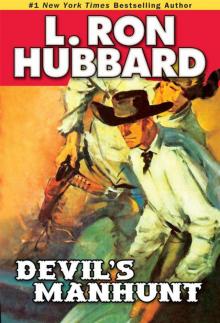 Devil's Manhunt
Devil's Manhunt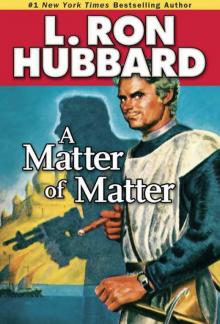 A Matter of Matter
A Matter of Matter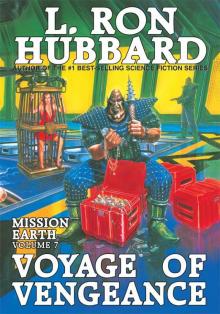 Voyage of Vengeance
Voyage of Vengeance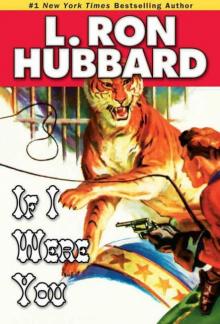 If I Were You (Science Fiction & Fantasy Short Stories Collection)
If I Were You (Science Fiction & Fantasy Short Stories Collection) L. Ron Hubbard Presents Writers of the Future Volume 35
L. Ron Hubbard Presents Writers of the Future Volume 35 Mission Earth Volume 4: An Alien Affair
Mission Earth Volume 4: An Alien Affair Black Genesis
Black Genesis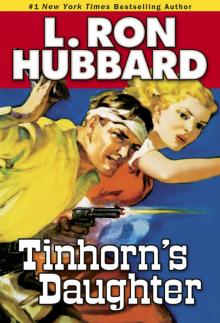 Tinhorn's Daughter
Tinhorn's Daughter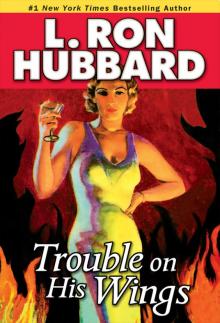 Trouble on His Wings
Trouble on His Wings Writers of the Future Volume 27: The Best New Science Fiction and Fantasy of the Year
Writers of the Future Volume 27: The Best New Science Fiction and Fantasy of the Year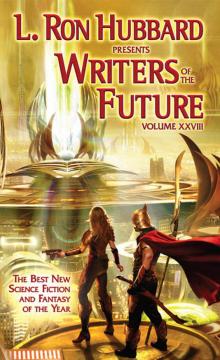 Writers of the Future Volume 28: The Best New Science Fiction and Fantasy of the Year
Writers of the Future Volume 28: The Best New Science Fiction and Fantasy of the Year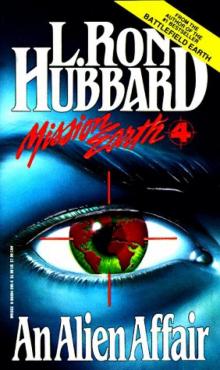 An Alien Affair
An Alien Affair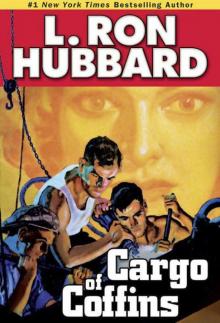 Cargo of Coffins
Cargo of Coffins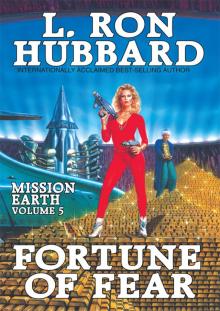 Mission Earth Volume 5: Fortune of Fear
Mission Earth Volume 5: Fortune of Fear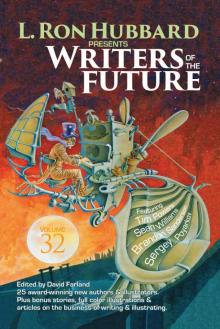 Writers of the Future 32 Science Fiction & Fantasy Anthology
Writers of the Future 32 Science Fiction & Fantasy Anthology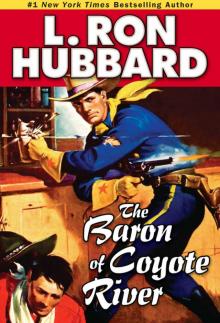 The Baron of Coyote River
The Baron of Coyote River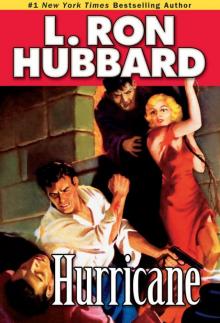 Hurricane (Stories From the Golden Age)
Hurricane (Stories From the Golden Age) Dianetics: The Modern Science of Mental Health
Dianetics: The Modern Science of Mental Health Writers of the Future, Volume 30
Writers of the Future, Volume 30 Battlefield Earth: A Saga of the Year 3000
Battlefield Earth: A Saga of the Year 3000 Fear
Fear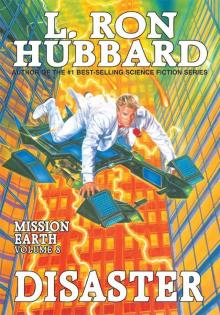 Disaster
Disaster Invaders Plan, The: Mission Earth Volume 1
Invaders Plan, The: Mission Earth Volume 1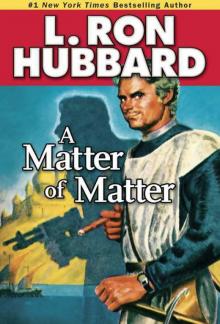 A Matter of Matter (Stories from the Golden Age)
A Matter of Matter (Stories from the Golden Age) Writers of the Future Volume 34
Writers of the Future Volume 34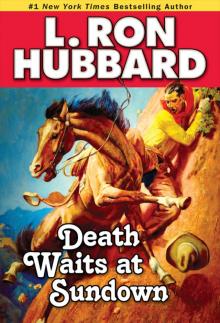 Death Waits at Sundown
Death Waits at Sundown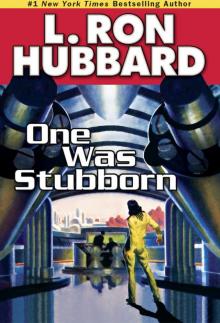 One Was Stubbron
One Was Stubbron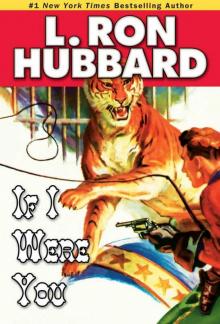 If I Were You (Stories from the Golden Age)
If I Were You (Stories from the Golden Age)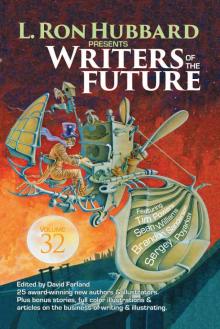 Writers of the Future 32 Science Fiction & Fantasy Anthology (L. Ron Hubbard Presents Writers of the Future)
Writers of the Future 32 Science Fiction & Fantasy Anthology (L. Ron Hubbard Presents Writers of the Future)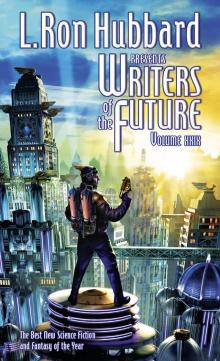 Writers of the Future, Volume 29
Writers of the Future, Volume 29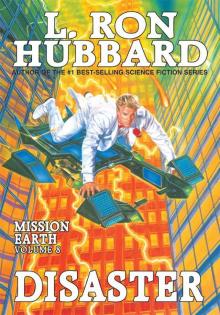 Mission Earth Volume 8: Disaster
Mission Earth Volume 8: Disaster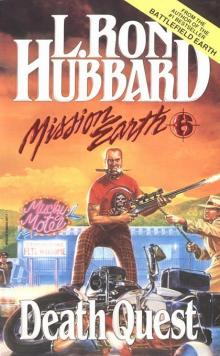 Mission Earth 6: Death Quest
Mission Earth 6: Death Quest Writers of the Future, Volume 27
Writers of the Future, Volume 27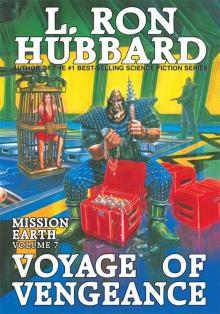 Mission Earth Volume 7: Voyage of Vengeance
Mission Earth Volume 7: Voyage of Vengeance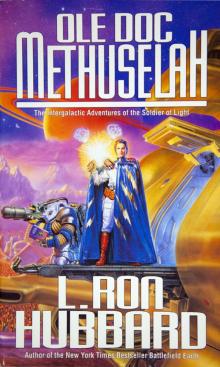 Ole Doc Methuselah
Ole Doc Methuselah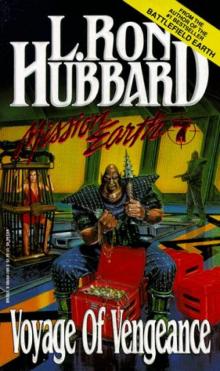 Mission Earth 07: Voyage of Vengeance
Mission Earth 07: Voyage of Vengeance Battlefield Earth
Battlefield Earth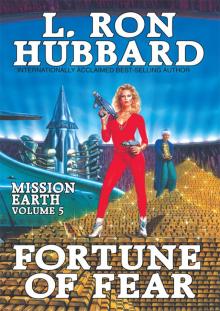 Fortune of Fear
Fortune of Fear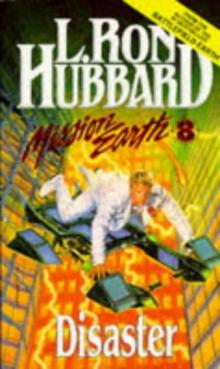 Mission Earth 8: Disaster
Mission Earth 8: Disaster Mission Earth Volume 10: The Doomed Planet
Mission Earth Volume 10: The Doomed Planet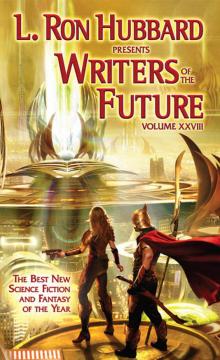 Writers of the Future, Volume 28
Writers of the Future, Volume 28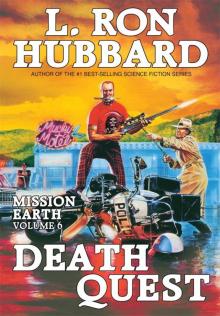 Mission Earth Volume 6: Death Quest
Mission Earth Volume 6: Death Quest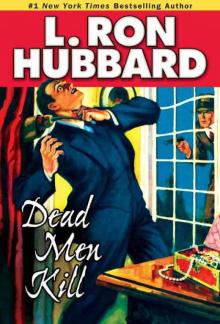 Dead Men Kill (Stories from the Golden Age)
Dead Men Kill (Stories from the Golden Age)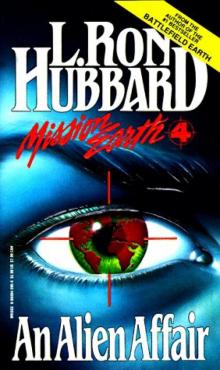 Mission Earth 4: An Alien Affair
Mission Earth 4: An Alien Affair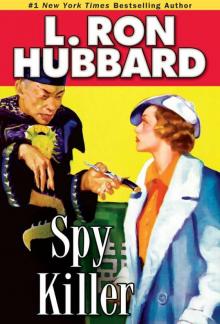 Spy Killer (Stories from the Golden Age)
Spy Killer (Stories from the Golden Age) Mission Earth Volume 9: Villainy Victorious
Mission Earth Volume 9: Villainy Victorious L. Ron Hubbard Presents Writers of the Future, Volume 33
L. Ron Hubbard Presents Writers of the Future, Volume 33